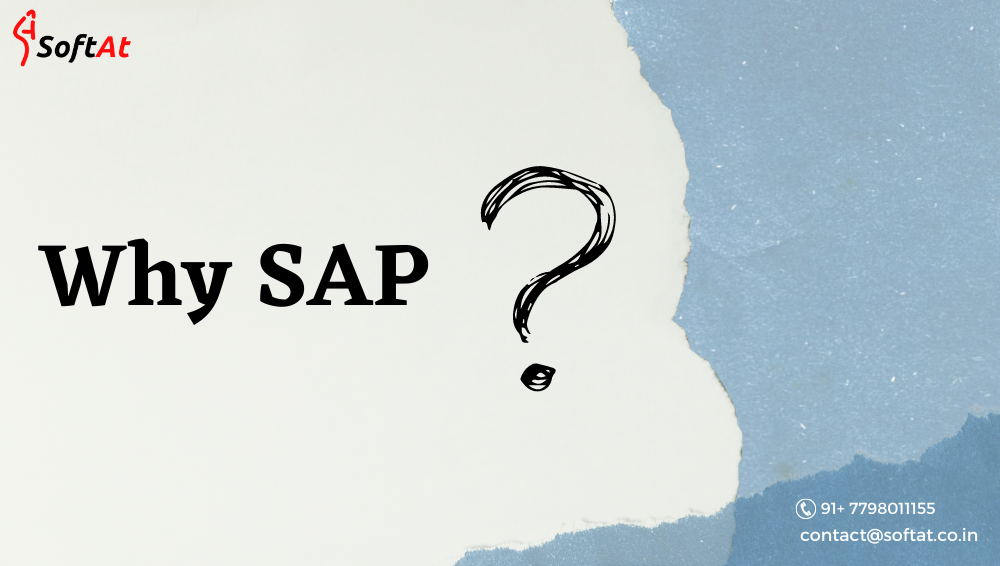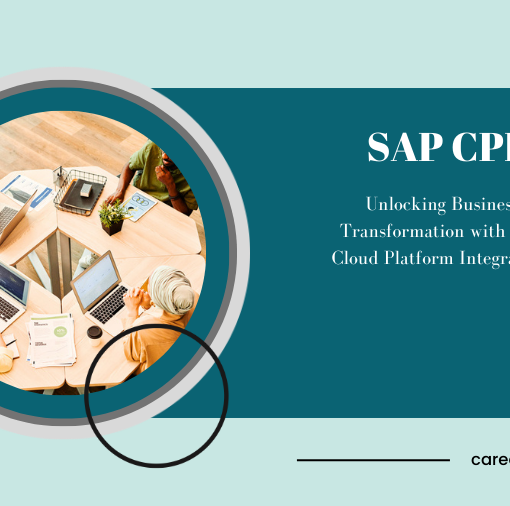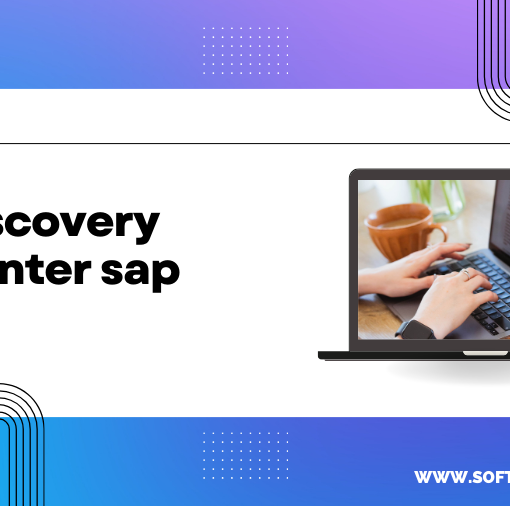
Why SAP used?
SAP provides “future-proof Cloud ERP solutions that will power the next generation of business.” With its advanced capabilities, SAP can boost your organization’s efficiency and productivity by automating repetitive tasks, making better use of your time, money, and resources. why SAP.
Each business holds its objectives and goals, procedures, and requirements. Most importantly, the current businesses require innovative technologies with complete functions that fill the gap between business processes and folks. An organization has several departments and teams, in order to run them successfully; there should be an ERP system that supports them by coordinating all information and communication within the organization. An ERP system is a grouping of software, and the company’s activities carried out to accomplish various operations. An ERP software helps to adjust the entire project value chain and also simplifies the critical processes effectively and efficiently.
Presently, SAP ERP is one of the powerful Enterprise Resource Planning systems. SAP stands for Systems, Applications, and Products in data processing. In the year 1972, Wellenreuther, Hopp, Hector, Plattner, and Tschira founded SAP software. SAP system includes various integrated modules, which covers almost all the feature of business management. Since 2010, SAP has had more than 140,000 installations globally, over 25 industry-specific business solutions, and more than seventy-five thousand customers in 120 countries.
Why SAP is used in industries
SAP provides “future-proof Cloud ERP solutions that will power the next generation of business.” With its advanced capabilities, SAP can boost your organization’s efficiency and productivity by automating repetitive tasks, making better use of your time, money, and resources.
What is special about SAP?
SAP (Systems, Applications, and Products in Data Processing) is a global leader in enterprise software solutions. There are several aspects that make SAP special and differentiate it from other software providers:
- Industry Focus: SAP offers industry-specific solutions tailored to the unique needs and challenges of various sectors, including manufacturing, retail, healthcare, finance, utilities, and more. These industry-focused solutions provide preconfigured business processes, best practices, and specific functionalities that align with industry requirements.
- Comprehensive Suite of Applications: SAP provides a comprehensive suite of integrated applications that cover a wide range of business functions, including ERP, CRM, SCM, HCM, analytics, and more. This enables organizations to leverage a unified platform for managing their operations, streamlining processes, and gaining insights across different functional areas.
- Scalability and Flexibility: SAP solutions are designed to scale and adapt to organizations of all sizes, from small businesses to large enterprises. The modular architecture of SAP applications allows organizations to start with the functionalities they need and easily add or customize features as their requirements evolve.
- Global Reach and Support: SAP has a strong global presence and serves customers in various countries and industries. It has an extensive partner network and a dedicated support system to assist customers in implementing, managing, and optimizing their SAP solutions. The availability of localized versions and support for multiple languages and currencies further enhances its global appeal.
- Innovation and Continuous Improvement: SAP invests heavily in research and development to drive innovation and stay at the forefront of technology trends. The company continuously enhances its products, leveraging emerging technologies like artificial intelligence (AI), machine learning (ML), Internet of Things (IoT), and blockchain to deliver cutting-edge solutions and address evolving customer needs.
- Integration Capabilities: SAP provides robust integration capabilities, allowing organizations to connect their SAP systems with external applications, third-party solutions, and partner systems. This enables seamless data exchange, process automation, and collaboration across the entire business ecosystem.
- Extensive Ecosystem: SAP has a vast ecosystem of partners, consultants, developers, and user communities that contribute to the growth and enhancement of SAP solutions. This ecosystem provides a wealth of resources, expertise, and add-on solutions that extend the capabilities of SAP applications and cater to specific customer requirements.
- Strong Track Record: SAP has a long-standing reputation and a proven track record of successful implementations and customer satisfaction. Its solutions have been adopted by numerous organizations worldwide, including many Fortune 500 companies, to drive operational efficiency, digital transformation, and business growth.
In summary, SAP stands out as a leading enterprise software provider due to its industry focus, comprehensive suite of applications, scalability, global reach, innovation, integration capabilities, extensive ecosystem, and a track record of successful implementations. These factors contribute to its uniqueness and make it a preferred choice for organizations seeking powerful and reliable business solutions.
Importance of SAP :
1. Career growth :-
An SAP Certified candidate can get many opportunities in the IT industry. As it is used worldwide it has very much demand so being SAP-certified will definitely give you a bright future. SAP has many modules in which candidates can specialize and can get a job in that particular field. Not only experience candidates but fresher’s can also do SAP professional courses to give their career a good start.
2.User-Friendly Software :-
SAP is used by almost all over the world.
More than 120 countries companies are using this software as their daily operation this is because it is user-friendly software and can handle every operation of an organization. Many times we find different systems are needed to perform different operations such as one system is needed for general ledger, another is needed for sales process again another one is
required for production procedure but this can be solved if you used SAP ERP systems. Every function can be managed in one system.
3. Increase productivity and reduces the cost :–
With the implementation of SAP productivity increases on the other hand use of SAP reduces cost. This is because earlier as we have discussed that different system are required for different operations but with the help of SAP software, different operations can be maintained which cuts the cost of the company. To maintain continuity, logicality, adjustability SAP expands its process through gathering transactions, information, and cooperating work.
4. Flexible and minimize:-
SAP software is very flexible to use and it is very cooperative, that’s why a company can easily buy the particular module that matches their company’s operation. Multiple business summons and risks can be reduced and solved by SAP professional training. It is the most trusted software and is used all over the world. If you want to resolve the complex business challenges in SAP you need to rely on long-term development you should have working experience with different organizations rather than with any dealer.
5. Develop IT Expenses:-
SAP helps to increase business development, it also reduces the cost of high integration expenses which need to obtain third-party software.
6. Obtain Higher ROI Faster :
By installing SAP you can achieve higher
ROI faster and by using a quick implementation strategy that costs less than half the value of the traditional therapeutic approach. Many times,
companies can reduce the execution time and cost by gaining a benefit over specific gaming and prepackaged versions offered for certain companies.
Why to use SAP
Consider just one massive challenge that a product business may face.
Within the area of logistics, there are multiple functions – material management, sales and distribution, warehouse management, customer service, and fleet management, to name just a few. Each of these departments may have its own technology for its operation. But how do these departments communicate with one another, so that data is integrated and analyzed and sound business decisions can be made based on that data?
An SAP solution that integrates all of these functions provides that data, along with access of stakeholders to that data. Once all of these functions are integrated, it is easier to make decisions that will result in:
- Single integrated platform implementation & TCO reduction for business applications full support;
- Fewer stock outages and resultant reduction in loss of sales (increased revenue);
- More efficient and reliable materials purchasing with resultant cost-savings and fewer production delays;
- Improved customer satisfaction due to fewer delays in product delivery;
- Reduced distribution and freight costs.
Your business may not be in a manufacturing niche, but there are SAP modules for virtually every business operation that will improve the flexibility and full integration of those operations and provide both efficiency and cost savings on every stage of the product’s lifecycle.
And the beauty of SAP software is that only those modules that a business may need can be secured and implemented – providing customized solutions.
Why SAP is best
6 Reasons Why SAP is Better Than Other ERP Systems
Modular and Customizable
As mentioned earlier, SAP’s most prominent feature lies in its ability to cater to all types of businesses, no matter how small or big they are. Bear in mind that this is not common in the ERP market, where systems usually target a specific business size.
The main feature behind this ability lies in SAP’s modularity and customizable system type. It comprises different modules, which are further divided into technical modules and functional modules. As such, clients can mix and match to find the most suitable module combination for their company’s needs.
Higher Scalability
Growing pains is a common problem for a lot of developing companies. As transactions increase and business operations transform, it is critical to have a strong technological backbone that can adjust to these changes.
SAP’s three-tier, the client-server architecture gives the system a lot of leeway in terms of flexibility. Since SAP is modular and customizable, clients have the option to acquire new features and upgrade their current systems to address new business demands.
Simple and User-Friendly
ERP systems are notoriously complex and for a good reason. These systems are massive, processing and storing countless amounts of data at the same time.
However, having more functionality does not immediately translate to better results. Contrarily, having too many functions—which may not be necessary to the business—only lengthens the learning curve for employees. After all, the more complex the system, the longer it will take for company personnel to get used to it.
One impressive aspect of SAP is that, despite its complex features, it remains simple and user-friendly. By conducting an in-depth case study beforehand and eliminating unnecessary functions, clients will be able to shorten the learning curve and still enjoy all of the SAP features the company needs.
Shorter Implementation Time
Another formidable aspect SAP boasts is its out-of-the-box functionality. The implementation process is straightforward, and unlike many other ERP systems, it does not need as much customization.
Additionally, clients can also connect the SAP ERP system to third-party services. For example, SAP has cloud solutions that enable companies to use complimentary services like PayPal and Google. In this manner, performing tasks across the enterprise—whether locally or internationally—becomes possible and more efficient.
Crosses Industry Boundaries
As stated before, ERP systems are often designed to cater to select industries. For example, TradeGecko, an Australia-based company, is more suitable for retail with its inventory and order management features. On the other hand, Ellucian ERP caters to the educational sector specifically.
It is uncommon to find an ERP system that crosses industry limits, which makes SAP all the more impressive. For companies venturing outside of their industries and expanding product lines, it is particularly useful to have an SAP system. With its wide selection of customizable features, clients can scale up their ERP and minimize the adjustment period for the rest of the company.
Quicker Financial Payback
Several companies may hesitate to use SAP due to its price tag. In the ERP market, it is the second most expensive ERP system behind Oracle. However, SAP also provides the fastest financial payback in the industry.
Compare the numbers. According to the research conducted by the Panorama Consulting Group, the average time it takes for companies to see a return on investment is 2.7 years. Meanwhile, the average time it takes for SAP to show these benefits is only nine months.
The numbers speak for themselves. It becomes quite clear why SAP is one of the leading ERP systems worldwide, used by industry giants and smaller businesses alike.
While SAP boasts a nearly complete out-of-the-box functionality, it is still quite complex to install alone. Hence, the guidance of ERP consultants and reliable system providers are crucial for a successful implementation. Make sure to conduct research first on verified SAP partners like ANSI, and find the SAP system configuration that best suits your company.






One thought on “Why SAP ?”